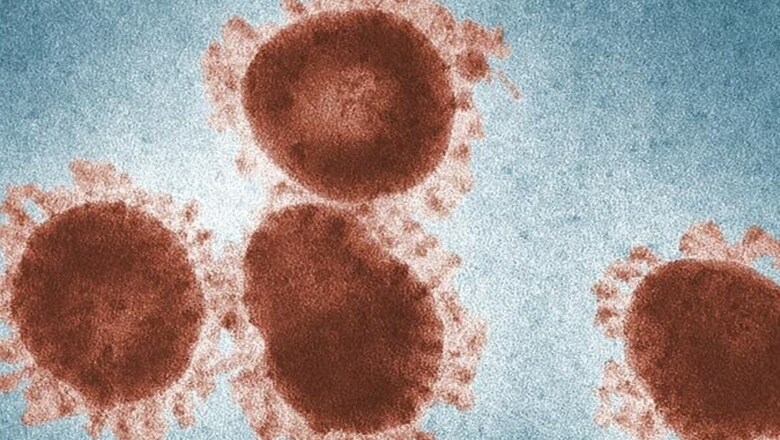
views
With the onset of the COVID-19 pandemic last year and now its resurgence in the second wave we have been left unprepared in a true sense to fight this biggest threat to the human race in recent times. There are different aspects that need to be seen which in general can help us understand and plan better for the future as this disease is here to stay and may not be gone so soon.
Issues with COVID pandemic
COVID infection has posed a recent threat to mankind especially considering its intensity of spread and also severity and increased mortality in cases with comorbidities or older age. The best of the countries too have failed in providing adequate attention to ailing cases because of a simple reason of the sudden rise in the total number of cases in society surpassing limits that healthcare infrastructure can accommodate at any given time. Secondly, being totally new viral disease, assured and complete treatment and prevention will take time to develop by researchers. So to limit the spread and halt the rate of spread is the best way forward as of date.
COVID and cancer
In the last year, we have seen COVID infecting mostly the older age group, but now even the young and children are getting infected in the second wave probably due to the new mutant variant. Although complications can arise in almost any case, most people with co-morbidities and immune-compromised state have been found to be infected earlier and also have a more complicated clinical course with mortalities. Cancer being a known immuno-compromised state thus poses a risk factor. Moreover, the issue with cancer is unawareness, late presentation and lack of timely treatment which has made cancer one of the most dreaded diseases. With COVID scare in public – restrictions due to lockdown and prevention protocols, it has posed as a major roadblock in active management in needy cancer patients. This has left the common public and also the caregivers confused about the right approach in cancer care in this pandemic era.
Effect of covid on cancer management
Cancer is a disease that is known of stage progression if left untreated. Also, cure from cancer treatment largely depends on the stage that the patient presents. Thus cancer is a disease where we cannot hold treatment fearing a possible infection that may or may not affect the individual depending on exposure risk and on the contrary may also not be symptomatic or life-threatening even if infected, in all cases. At the same time in an already infected case, an individual’s capacity to fight infection in an immune-compromised state created with cancer therapy and the risk of cancer progression outcome on survival if treatment delayed is something that has to be weighed with caution.
Effect on infrastructure and caregivers
Apart from the effect of COVID on individuals, the effect on infrastructure and caregivers also decides the management in cancer cases. With the sudden rise of Covid cases, as per government policies, a big share of infrastructure (beds, ICUs, oxygen, medications, staff) is being diverted to COVID emergencies, which is logical too. However, this poses a serious threat to our capabilities of providing adequate care to non-Covid oncological emergencies and timely intervention in needy patients. Although the priority between a COVID or an oncological malignancy is something that cannot be decided so easily, at least treatment-related known morbidities and emergencies in cancer cases is something that really needs to be looked into.
Lessons learnt and precautions for future
To summarise, it should be known that COVID is here to stay. State, caregivers and individuals in public have their own important role to play. The first and the foremost role is of an individual to take all steps to avoid the spread of Covid infection by social distancing, face masks and frequent hand-washing. Specific to cancer patients do understand that cancer growth will not stop so we cannot neglect this disease, be it a pandemic or no pandemic. Timely detection of symptoms, consultation by specialists be it physical with all Covid precautions or better by a virtual mode can at least help detect urgency, stage and then prioritize treatment to see if it can be delayed or needs an urgent start. Once diagnosed, caregivers take all due precaution to decide appropriate treatments where routine management can be slightly modified with non-invasive and less toxic therapies given priority.
Truncated iso-effective therapies needing lesser visits and monitoring if possible are preferred. More emphasis on preparing the patient for treatment with adequate nutrition, timely immunization prevention and preventive treatments to spare cases landing into severe treatment-related complications and admission is advocated. Understanding limited resources especially as seen in this second wave, it will be prudent to choose alternatives, where chances of medical emergencies and need for special care like oxygen and ICUs, are reduced as far as possible.
Lastly, there is a huge demand and need for the authorities from state health departments to understand the ardent need for expansion of our health care system, timely pre-planning of improving infrastructure and establish disaster management protocols where we are well prepared to fight such unpredicted emergencies and we have ample preparedness to support our ailing population in the time of need and none of them suffers due to lack of healthcare facilities at least. It’s an ongoing battle, which we sure are going to win with patience, understanding, cooperation and collaboration.
Read all the Latest News, Breaking News and Coronavirus News here. Follow us on Facebook, Twitter and Telegram.




















Comments
0 comment